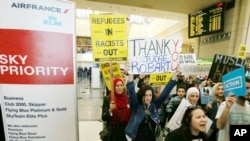A U.S. federal judge who temporarily halted the enforcement of President Donald Trump's entry ban ruled Monday that the case challenging the ban itself will move forward, while another federal judge issued a new injunction to keep the ban from being implemented in the state of Virginia.
District Court Judge James Robart ruled earlier this month that people from Iraq, Iran, Syria, Libya, Yemen, Somalia and Sudan who have valid visas to enter the U.S. may do so, and the nation's refugee admissions program can continue, all while courts consider whether Trump's executive order is legal.
Since that ruling, the government appealed to a three-judge panel at the 9th Circuit Court of Appeals, which upheld Robart's decision to pause enforcement of the ban.
The higher court has 25 circuit judges, and one of them asked last week that the entire group vote on whether to have an 11-member panel re-hear the arguments about whether the temporary enforcement suspension should remain in place. The two sides in the case are due to submit their briefs to that court by Thursday.
The Justice Department asked Judge Robart on Monday to not go any further in considering the overall legality of Trump's order until the 9th Circuit makes its decision, but Robart denied the request.
The state of Washington, which along with Minnesota is leading the legal challenge, argued holding hearings on the constitutionality of Trump's order in the lower court will not interfere with the appeal happening at the 9th circuit.
The Trump administration says it is within its authority to institute the ban, citing the need to protect the nation's security. It has also rejected criticisms that the ban, which involves majority-Muslim countries, is a ban on Muslims entering the U.S.
During Trump's campaign, he originally proposed not allowing Muslims into the country, but later altered the plan to instead target nations with links to terrorism.
District Court Judge Leonie Brinkema cited those statements in her ruling Monday in Virginia that imposed a preliminary injunction against the enforcement of the entry ban portion of the executive order. It does not apply to the refugee program.
"The question is whether the EO (executive order) was animated by national security concerns at all, as opposed to the impermissible motive of, in the context of entry, disfavoring one religious group and, in the area of refugees, favoring another religious group," Brinkema wrote.
The U.S. Constitution forbids the government from establishing an official religion or taking actions that promote or inhibit religion. Trump's order specified that refugees who are a religious minority in their country and facing persecution would still be eligible for admission to the U.S.
"Although there is no interest more weighty than a bona fide national security concern, the defendants have presented no evidence to support their contention that the EO is necessary to national security," Brinkema said in ruling against Trump.
Virginia based its case on the impacts of the ban on its state universities and community colleges, saying students were withdrawing applications, schools would lose tuition money and that Virginia students studying abroad could face inflamed anti-American sentiment.
Brinkema cited a state university official who said the ban affected international travel for at least 350 students at five of the state's biggest schools.





